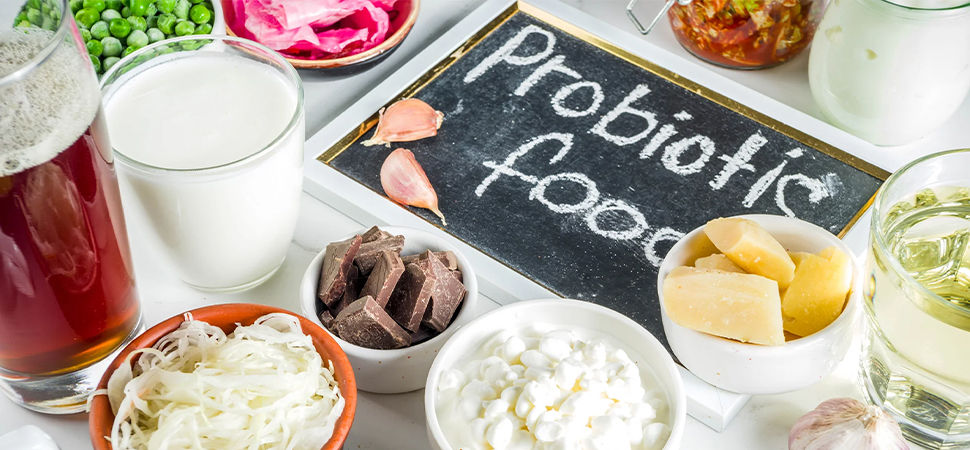Are you constantly facing major digestive issues like constipation, diarrhea, bloating, and heartburn? Then you most probably have bad gut health. What is gut health? The scientific term for the gut is the Gastrointestinal (GI) system. The health of your gut determines the overall health of your immune system.
Thus, taking care of your gut becomes a top priority. If your gut health is bad, it results in a weak immune system, ultimately affecting your mood and the overall digestive system. Many of us suffer from such issues and often don’t know how to improve them.
However, it is immensely essential for each and every one of us to educate ourselves on such a subject. Standing true to the statement that it is never too late, now discover 9 proven ways to enhance gut health at home. These science-backed tips will improve your overall well-being, from mood to skin health and more.
1. Eat a variety of Vegetables and Fruits

Yes, vegetables. Though many of us are not a fan of vegetables, they work as an excellent source of fiber for a healthy gut microbiome. This gut microbiome consists of trillions of microorganisms with both – good and bad bacteria. And for you to be healthy, these bacteria must coexist peacefully in your gut. So, eating foods like vegetables, fruits, legumes, and other high in fiber foods helps in the growth of good bacteria.
2. Eat Prebiotic Foods

What are prebiotic foods? These are normally classified as soluble fibers. They serve as a very good food source for your gut’s microorganisms. In simple terms, when you eat prebiotic foods, the microorganisms in your gut break them down and further metabolize and ferment them, creating multiple byproducts like short-chain fatty acids, which help cure inflammation and immunity. Some of the prebiotic foods that you can include in your diet are honey, oats, seaweed, mushrooms, and berries.
3. Sleep A Lot

“Early to bed and early to rise makes a man healthy, wealthy, and wise.” A commonly heard phrase reminding us of our childhood. It’s high time you follow this on a daily basis if you’re already suffering from bad gut health. Here’s an interesting fact, an average adult human needs at least 7 hours of sleep per night.
Irregular sleep habits can have a negative impact on your gut flora, making you vulnerable to many kinds of health issues. On the other hand, getting enough sleep can help you improve your gut health, cognition, and heart health.
4. Reduce Your Stress Level

Keeping your mental health in check can also help your gut health. Stress is one of the major psychological issues people face nowadays. The reasons behind stress vary for each individual, but the effects are the same. High-stress levels affect your digestive system by increasing the acids in your stomach, causing indigestion.
And in worse cases, you might suffer from Irritable Bowel Syndrome (IBS) and peptic ulcers. To avoid these, you must manage your stress levels by opting for psychotherapy, meditation, developing time management skills, listening to music, or playing with your pet.
5. Eat Probiotic Food

The good bacteria in your stomach are known as probiotics. Many people take probiotic supplements that can be easily found in nearby drug stores or even online. These are usually taken to boost the growth of the beneficial bacteria in your gut.
But if you don’t want to take supplements, you can always go for probiotic-rich foods. One of the best gut health foods to add to your daily diet is fermented foods like kimchi, yogurt, kombucha, tempeh, and pickles.
6. Hydrate Yourself Regularly

‘Keep drinking plenty of water’ is a basic health advice you hear from every doctor. But do you know why it is so important and how it helps your gut? It helps in better cognition, energy, and metabolism.
Whereas if your body is dehydrated, it slows down your secretion process to extract more water from the stool, leading to constipation. To prevent constipation and other health-related problems, a minimum of 72 ounces of water per day should be your general water intake guideline so that fiber-rich food functions properly.
7. Increase Your Fiber Intake

One of the most effective ways to improve gut health is by inculcating a high-fiber diet. Dietary fiber is the non-digestible part of plant-based foods that nourishes your gut bacteria. A sufficient amount of fiber supplements can reduce the risk of type-2 diabetes, various heart diseases, obesity, and even certain cancers.
Daily fiber intake with high-fiber foods, such as fruits, whole grains, legumes like black beans, and even nuts and seeds, helps to maintain a healthy gut microbiome. You should at least consume 25-30 grams of different types of fiber daily to support your optimal gut health.
8. Exercise Daily

Regular physical activity isn’t just good for your body; it’s also beneficial for your gut. Working out on a daily basis can positively influence the diversity and growth of gut bacteria.
It helps reduce inflammation, helps weight loss, improves heart health, and balances your gut microbiome. Aim for at least 150 minutes of exercise per week, along with muscle-strengthening exercises, to gain from these gut-boosting benefits.
9. Don’t take Antibiotics Unnecessarily

Many of us consider antibiotics to be essential for treating bacterial infections, though true, their overuse can harm your gut health. Antibiotics can disrupt your gut microbiome’s balance by killing both harmful and beneficial bacteria. So, rather than taking antibiotics frequently, consult your doctor to determine if the antibiotics are really necessary.
If they are, complete the course as prescribed, but do not continue any further. To help your gut recover after antibiotic use, consider taking probiotics or consuming probiotic-rich foods like yogurt and other fermented foods.
Conclusion
The food you eat goes through your digestive tract playing a major role in preventing health problems. Your gut health is deeply associated with your overall well-being, so taking steps to improve and maintain it is crucial. By following these science-backed tips, such as increasing fiber intake, exercising regularly, and consuming probiotic and prebiotic foods, you can enhance the diversity and balance of your gut microbiome.
But before you make any major changes in your diet, make sure you talk it out with your registered dietitian. Because for those who suffer from major digestive issues, these simple methods may not be very useful. So, make these changes in your lifestyle to nurture your gut and enjoy the benefits of a happier and healthier life.
Latest Articles
-

Top 9 Ways To Reduce Stress in Your Daily Life
January 19, 2024
-

Top 9 Walmart Black Friday Beauty Products Deals
November 23, 2023
-

Liquid Web Hosting Review in Detail
October 25, 2023
-

AppSumo Review – What is AppSumo, Lifetime Deals & Tips
October 23, 2023
-

Top 9 Mental Health Apps for Meditation and Mindfulness
October 20, 2023

